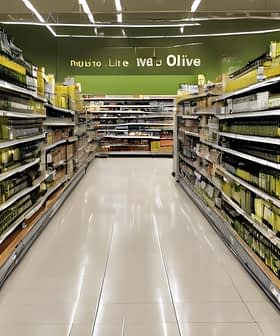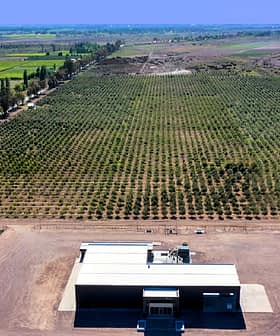New Year, Same Problems for Greek Olive Oil Producers
Olive oil production varied from area to area, but uniformity of low prices was a constant across all of Greece.
After a poor previous harvesting season that lead to a low yield somewhere between 150,000 and 200,000 tons of olive oil, the current season began in September with high hopes for many olive oil producers in Greece.
Five months on, Crete has already lost a large part of its usual production and uncertainty prevails in the whole Greek olive oil sector due to unexpected setbacks in production and flaccid prices of the extra virgin olive oil.
While my olive oil is of excellent quality, the selling price is demeaning. The money I earned this season does not even cover the overall cost of the harvest. I cannot understand why prices are so low.
Many producers eagerly anticipated a strong yield but were disappointed when they got only a fraction of their expected production. Others were happy to make large volumes of quality olive oil but were consequently upset by the current selling prices, ranging at €2.10 to €2.40 ($2.34 to $2.68) on average for a kilogram of extra virgin olive oil.
Konstantinos Papadopoulos of the Papadopoulos Olive Oil Mill, a repeated winner at the NYIOOC World Olive Oil Competition, told Olive Oil Times that the olive oil of the season is of high quality but modest quantity.
See Also:2019 Harvest News“Harvesting started in our area in early October, when we processed the early-picked olives that give the agourelio, (early harvest olives) and is expected to end in late January or early February. Fortunately, we had no manifestation of the fruit fly in our area and we got extra virgin olive oil of high quality, compared to previous seasons, although of a medium quantity,” Papadopoulos said.
Papadopoulos was optimistic for the outcome of the season, despite the low prices.
“The global olive oil market defines the prices, which vary in our area between €2.20 ($2.44) and €2.40 ($2.67) per kilogram with a downward trend,” he said. “We remain optimistic but with low expectations since producers’ costs tend to exceed the revenue due to the low selling prices of olive oil.”
On Euboea Island, the olive tree grower and mill owner Vasileios Koukouzas saw his yield being diminished by a mysterious disease, as he told Olive Oil Times.
“We grow and harvest our own trees here, and we make only organic extra virgin olive oil from Koroneiki and Megaritiki varieties,” Koukouzas said. “This season the biggest problem was a disease that blackened the olives within a week from its manifestation and made them fall on the ground.”
“We did not have the time to look into it further due to the ongoing harvest, and we would still be harvesting in 2020 if it wasn’t for this pathogen,” he added. “But despite the problems, we managed to get a decent quantity of extra virgin of low acidity ranging at 0.3 to 0.4.”
At the nearby city of Eretria the same problem occurred, the owners of the Amarynthos olive oil mill reported to Olive Oil Times.
“We operate a new mill that opened in 2017 when we had a prosperous production,” they said. “Last season we did not even bother to open due to the minimal production, and the current season is also a bad one both in terms of quality and quantity.”
“We had serious problems with the fruit fly and with a pathogen, possibly the gloeosporium, that dropped the olive drupes from the trees,” they added. “This was not only our problem but from what we know most producing areas of Central Greece faced the same situation.”
They also said that the olives they managed to process gave extra virgin olive oil with an acidity level of 0.5, a bit lower than the quality they were after.
Leonidas Chras from Lokrida in Fthiotida region, one of the few Greek growers to cultivate the Arbequina variety, was unaffected by the pathogen and had a strong harvest but with low prices.
“We had no problems with the fruit fly, and only around Christmas we noticed some minor infestations,” Chras told Olive Oil Times. “All in all, we had a good yield with extra virgin olive oil of low acidity. The market price of one kilogram of extra virgin olive oil is currently at €2.40 ($2.67) in our area, and we only sell at a higher price of €3.20 ($3.57) to some private buyers.”
Other growers and producers in several other olive oil making territories of Greece expressed their uncertainty about the prevailing conditions in the olive oil sector of the country.
Nikitas Andriopoulos, a producer based in western Peloponnese, complained that though he made top-quality olive oil this year, the income from his olive business is not enough to cover the expenses.
“While my olive oil is of excellent quality, the selling price is demeaning,” Andriopoulos said. “A kilo of extra virgin costs €2.20 ($2.46) and the money I earned this season does not even cover the overall cost of the harvest including the payments to the workers. I cannot understand why prices are so low.”
In Magnisia, at the foot of Mount Pelion, the local growers and producers protested that on top of the low prices of the extra virgin olive oil (reaching as low as €2.00 – $2.23 – per kilogram), the fruit fly and the gloeosporium caused great damage to the olive oil production of the area and the edible olives as well.
They have also asked for compensation from the state, and in advance to apply private storage of the olive oil to strengthen its market price.
Even in Lesvos, where the local olive oil industry was eager to recover from the catastrophic previous season aiming at a strong yield of olive oil with a near-record overall production of more than 17,000 tons, the high temperatures and the increased levels of humidity in October and November favored the development of pathogens that deteriorated the expected quality.
In conjunction with the prevailing low prices of approximately €2.20 ($2.44) per kilogram of extra virgin olive oil, the producers have asked for compensation and measures from the state to support the olive oil sector of the island.








